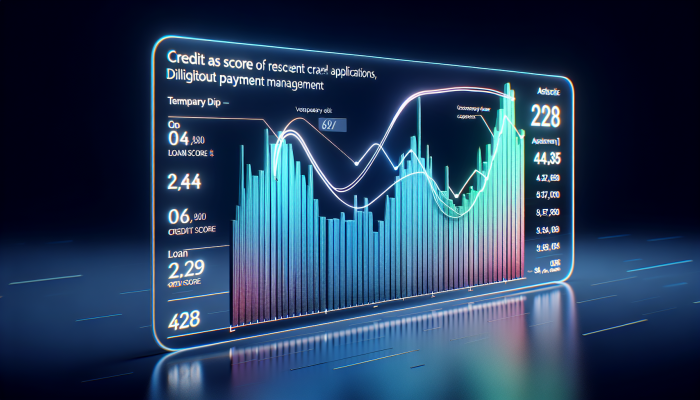Maximizing Your Credit Score: The Powerful Benefits of Debt Consolidation
Engaging in debt consolidation can serve as a transformative financial strategy that greatly enhances your overall financial health and stability. Understanding how debt consolidation affects your credit score is vital for making informed decisions that lead to a secure financial future. By delving into the complexities of your credit score and recognizing how consolidation influences it, you can adeptly navigate your financial journey with confidence and strategic foresight, ultimately fostering a more robust financial environment for yourself.
Understanding the Immediate Impact of Debt Consolidation on Your Credit Score

As you embark on your debt consolidation journey, you may encounter a brief decline in your credit score. This initial drop is primarily due to hard inquiries that occur when you apply for new credit accounts, such as a personal loan or a balance transfer credit card. Lenders perform these inquiries to evaluate your creditworthiness, and each inquiry can result in a minor reduction in your score. While this temporary dip may cause concern, it is typically a short-term setback rather than a long-lasting issue.
The initial dip in your credit score can be particularly daunting, especially if you are already facing financial challenges. However, you can effectively counteract this initial decline by managing your consolidated debt with care and ensuring timely payments. As you consistently fulfill your obligations on the new loan or credit card, the impact of the hard inquiry will diminish, and your score will gradually recover. This phase requires patience and a strong commitment to achieving your financial objectives.
Boosting Long-Term Credit Utilization Through Debt Consolidation
Among the most notable long-term advantages of debt consolidation is its capacity to lower your credit utilization ratio. This crucial metric assesses the relationship between your total credit card balances and your total available credit, playing a significant role in determining your credit score. A reduced credit utilization ratio conveys to lenders that you manage credit responsibly, which can substantially enhance your credit profile.
When you consolidate your debts, particularly by paying off high-interest credit cards, you can effectively decrease your outstanding balances. This reduction yields a healthier credit utilization ratio, ideally keeping it below the 30% threshold. By maintaining a low utilization rate, you not only enhance your credit score but also present yourself as a lower-risk borrower to financial institutions, positioning you favorably for future credit opportunities.
However, it is essential to sustain this low utilization ratio after consolidation. If you begin to accumulate new debt on your credit cards post-consolidation, you risk undermining the positive effects on your credit score. Therefore, adopting a disciplined approach to managing your credit after consolidation is crucial for achieving enduring success in your financial journey.
Recognizing the Importance of Payment History in Debt Consolidation
Your payment history is the most significant factor affecting your credit score, contributing approximately 35% to your FICO score. Utilizing debt consolidation to create a manageable payment plan can significantly bolster your credit profile. By consolidating your debts, you streamline your obligations into a single monthly payment, making it easier to stay organized and maintain control over your finances, ultimately enhancing your financial stability.
By consistently making on-time payments after consolidation, you can effectively improve your credit score. Each timely payment adds a positive entry to your payment history, helping to offset any initial negative effects from hard inquiries. The longer you maintain a solid payment history, the greater its positive influence becomes in the overall calculation of your credit score, fostering a more favorable credit landscape for you.
This journey may require discipline and perseverance, but the ultimate reward is a healthier credit score and an improved financial standing. Therefore, it is advantageous to view debt consolidation as a strategic tool rather than a mere temporary fix, as it can yield remarkable long-term benefits for your financial well-being.
Exploring Diverse Debt Consolidation Strategies and Their Credit Score Implications

Gaining a comprehensive understanding of the various debt consolidation methods is essential, as each approach carries specific implications for your credit score. By exploring these options, you can make informed choices that align with your financial goals and personal circumstances, allowing you to optimize the benefits of consolidation in your unique situation.
Effective Debt Consolidation with Personal Loans
Personal loans are a popular choice for debt consolidation, enabling you to combine multiple high-interest debts into a single loan with a fixed interest rate. This method can yield mixed effects on your credit score. When you apply for a personal loan, it generates a hard inquiry, which may result in a slight dip in your score. However, as you begin making regular payments, the positive impact on your credit score can be substantial.
Additionally, personal loans typically offer lower interest rates compared to credit cards, allowing you to save money on interest payments while effectively managing your debt. As you decrease your consolidated debt, your credit utilization ratio improves, further enhancing your credit score and overall creditworthiness.
However, it is vital to avoid accruing new debt while repaying your loan. This practice ensures that you maximize the benefits of debt consolidation while preserving a healthy credit score for the future.
Utilizing Balance Transfer Credit Cards for Debt Management
Balance transfer credit cards offer an appealing method for consolidating debt. These cards enable you to transfer high-interest credit card balances to a new card with a lower interest rate, often featuring an introductory 0% APR. This strategy can significantly reduce your interest payments while presenting specific credit score implications.
Applying for a balance transfer card will result in a hard inquiry, which may temporarily impact your credit score. However, if you manage to pay off your transferred balance within the promotional period, you can realize substantial savings. Furthermore, this approach can lower your credit utilization ratio, leading to a positive effect on your score, provided you keep low balances on your other credit cards.
Conversely, if you fail to pay off the balance before the promotional period concludes, the interest rate may increase dramatically, resulting in higher payments that could strain your financial situation. Additionally, maxing out your new balance transfer card could adversely affect your credit utilization ratio, leading to a negative impact on your score and overall credit profile.
Using Home Equity Loans for Strategic Debt Consolidation

Home equity loans present another pathway for debt consolidation, leveraging the equity in your home as collateral to secure a loan. This option can offer lower interest rates, which is beneficial for managing high-interest debts; however, it also comes with specific risks and implications for your credit score.
While a home equity loan can assist in lowering your credit utilization ratio and enhancing your score, the risk of losing your home in the event of default is significant. Similar to other consolidation strategies, applying for a home equity loan will result in a hard inquiry, which temporarily decreases your credit score.
It is essential to carefully evaluate your overall financial situation before pursuing this option. If you can confidently manage the payments and avoid accumulating additional debt, a home equity loan can serve as a valuable resource for consolidating debt while simultaneously enhancing your credit score in the long run.
Effective Strategies to Minimize Negative Credit Score Impact During Debt Consolidation
Implement the following strategies to ensure that your debt consolidation experience promotes rather than hinders your credit score. These practices will help you navigate the complexities of consolidation while safeguarding your financial well-being and enhancing your credit standing.
Choosing the Best Debt Consolidation Method for Your Financial Situation
Selecting the most appropriate debt consolidation method is crucial for minimizing negative effects on your credit score. Take the necessary time to thoroughly assess various methods, weighing their pros and cons in relation to your specific financial situation.
For instance, a personal loan may be a suitable choice if you have a stable income and a favorable credit profile, given its typically lower interest rates. Conversely, a balance transfer credit card with a lower limit could be more advantageous if your credit is less than ideal, allowing for an effective strategy to consolidate your debts.
Conduct comprehensive research on different lenders, scrutinizing the fine print, and ensuring that you fully understand the terms and conditions associated with each option. This diligence will empower you to choose a method that aligns with your financial objectives while minimizing any adverse impact on your credit score and future borrowing potential.
Maintaining a Low Credit Utilization Ratio Following Debt Consolidation
Once you have completed your debt consolidation, it is essential to maintain a low credit utilization ratio to protect your credit score. One effective strategy is to avoid taking on new debt on your credit cards while repaying your consolidated loan. This practice helps keep your credit utilization low and positively influences your credit score, reflecting your responsible credit management.
Additionally, consider utilizing budgeting tools to monitor your spending habits and ensure that you are living within your means. By maintaining low credit card balances and consistently making timely payments, you reinforce a positive credit history, which lenders highly value when assessing your creditworthiness.
Another practical approach is to request credit limit increases on your existing credit cards. This can enhance your total available credit, thereby lowering your credit utilization ratio, provided that you avoid increasing your spending in tandem.
Building a Strong Payment History to Enhance Your Credit Score
A solid payment history is vital for improving your credit score following debt consolidation. During the debt consolidation process, commit to making consistent, on-time payments. This dedication not only elevates your credit score but also instills a sense of financial discipline and responsibility.
Consider setting up automatic payments for your consolidated loan or credit card to ensure you never miss a due date. Regularly monitoring your accounts can provide additional peace of mind, allowing you to address any potential issues before they escalate into larger problems.
Remember, a positive payment history signals to lenders that you are a responsible borrower. Over time, this can lead to increased creditworthiness and the potential for more favorable loan terms and interest rates in the future.
Real-Life Case Studies: The Influence of Debt Consolidation on Credit Scores
To fully comprehend the effects of debt consolidation on credit scores, let’s analyze real-life scenarios and case studies. These examples will illustrate how individuals have navigated the complexities of consolidation and the resulting effects on their credit scores, providing valuable insights into the process.
Case Study: Overcoming High-Interest Credit Card Debt with Personal Loans
Consider Jane, who faced overwhelming high-interest <a href="https://berwicktestandtag.com.au/hidden-dangers-of-credit-card-debt-explained/">credit card debt</a>. With multiple cards maxed out and monthly payments spiraling out of control, Jane opted to pursue a personal loan for debt consolidation.
Initially, Jane’s credit score dipped due to the hard inquiry from her loan application. However, as she diligently made timely payments on her new loan, her credit score began to recover. Within a year, her credit utilization ratio decreased significantly, resulting in a noticeable improvement in her credit score.
Through disciplined financial management, Jane successfully transformed her financial landscape, leveraging debt consolidation to regain control over her credit and overall financial health.
Case Study: Streamlining Student Loan Payments for Better Management
A recent graduate, Mark, encountered the challenge of managing multiple student loans with varying interest rates. He chose student loan consolidation to simplify his payments and potentially reduce his interest costs.
Initially, Mark experienced a slight dip in his credit score due to the hard inquiry related to his consolidation efforts. Nevertheless, his credit score gradually improved as he made consistent payments on the consolidated loan. Mark maintained a healthy credit utilization ratio by avoiding additional debt, showcasing the positive impact of consolidation on his credit profile and long-term financial stability.
This case exemplifies how strategic debt consolidation can yield favorable outcomes for credit scores, particularly for young borrowers seeking to optimize their financial futures.
Case Study: Effectively Managing Multiple Small Debts through Balance Transfers
Sarah accumulated several small debts from personal loans and credit cards. She selected a balance transfer credit card with an introductory 0% APR to consolidate these obligations and streamline her payments.
While her credit score temporarily declined due to the hard inquiry, Sarah successfully paid off her transferred balance before the promotional period ended. As a result, her credit utilization ratio improved, and her credit score steadily increased, reflecting her successful debt management strategy.
Sarah’s experience highlights the importance of effectively managing consolidation methods and illustrates the significant potential for improved credit scores through disciplined financial practices and strategic planning.
Clarifying Myths and Misconceptions Surrounding Debt Consolidation and Credit Scores
As with any financial topic, various misconceptions surround debt consolidation and its effects on credit scores. Let’s clarify some of the most prevalent myths to gain a clearer understanding of this financial strategy and its implications.
Myth: Debt Consolidation Always Leads to a Lower Credit Score
A common belief is that debt consolidation inherently results in lower credit scores. While it is true that hard inquiries can temporarily impact your score, debt consolidation can ultimately promote long-term improvements. By focusing on responsible payment habits and reducing your credit utilization ratio, you can significantly enhance your credit profile and overall financial standing.
Understanding this nuance is essential for making informed decisions about your debt management strategies and recognizing the potential benefits of consolidation.
Myth: All Debt Consolidation Methods Produce the Same Outcomes
Another widespread misconception is that every debt consolidation method produces identical effects on your credit score. Different options—personal loans, balance transfers, and home equity loans—carry unique implications for your credit profile.
Each method possesses its own advantages and disadvantages, making it vital to assess them based on your individual financial situation and objectives. A tailored approach to debt consolidation can maximize its benefits for your credit score and overall financial health.
Myth: Debt Consolidation Erases Your Debt History
Some individuals mistakenly believe that debt consolidation eliminates their debt history, providing a clean slate. In reality, consolidating your debts does not erase your past payment history or existing balances; it merely combines them into a more manageable form.
Your credit report will still reflect your previous debts, and responsible management of the consolidated debt is essential for demonstrating your creditworthiness to lenders. Recognizing this fact can help you approach debt consolidation with realistic expectations and an understanding of its implications.
Answering Common Questions About Debt Consolidation and Its Effects on Credit Scores
How Long Does It Take for My Credit Score to Rebound After Consolidation?
Your credit score may typically take several months to recover following debt consolidation. The timeline for recovery varies based on your payment habits and overall credit utilization, as well as the specific strategies you implement post-consolidation.
Can Debt Consolidation Improve My Chances of Securing Better Loan Rates?
Absolutely, consolidating your debt can enhance your credit score, making you a more attractive borrower. This improvement may enable you to qualify for more favorable loan rates and terms in the future.
What Should I Do If My Credit Score Drops After Consolidation?
If you notice a decline in your credit score following consolidation, focus on making timely payments and maintaining low credit utilization. Over time, these actions can help rebuild your score and improve your financial standing.
Is Debt Consolidation the Right Solution for Everyone?
Debt consolidation may not be the ideal strategy for everyone. It is crucial to evaluate your financial situation, including your debts, income, and spending habits, before determining if this approach is suitable for your specific circumstances.
Can I Consolidate Student Loans and Credit Card Debt Simultaneously?
While student loans and credit card debts can be consolidated, they generally require different methods. To optimize potential benefits, consider specific options tailored to each type of debt and your individual financial needs.
Will Debt Consolidation Affect My Ability to Obtain New Credit?
Initially, debt consolidation may affect your ability to secure new credit due to hard inquiries. However, with responsible management of consolidated debt, your creditworthiness can improve over time, opening up new opportunities for borrowing.
Are There Fees Associated with Debt Consolidation?
Certain debt consolidation methods may incur fees, such as balance transfer or loan origination fees. It is essential to be aware of these costs before proceeding with consolidation, as they can impact your overall financial strategy.
How Can I Identify a Reputable Debt Consolidation Service?
Research and compare various debt consolidation services, focusing on reviews and ratings from trustworthy sources. Ensure the service is transparent about fees and provides a realistic plan for managing your debts effectively.
Is It Possible to Consolidate Debts Without a Strong Credit Score?
While a robust credit score simplifies consolidation, options exist for those with poor credit. Consider secured loans or collaborating with credit counselors to develop personalized strategies tailored to your financial circumstances.
Can Debt Consolidation Serve as a Long-Term Solution?
Debt consolidation can be part of a long-term financial strategy but requires ongoing discipline and responsible financial management. Use it as a stepping stone toward a healthier financial future, while continually assessing your financial habits and goals.
Connect with Us on Facebook
This Article Was First Found On: https://www.debtconsolidationloans.co.uk
The Article Debt Consolidation’s Impact on Your Credit Score Was Found On https://limitsofstrategy.com



I can relate to the nuances of debt consolidation and the emotional rollercoaster it can create—especially the initial credit score dip you mentioned. When I consolidated my debts a couple of years ago, I was taken aback by that first drop. It felt counterintuitive to be working towards financial stability yet seeing my score slip. Over time, I learned that the proactive steps I was taking, like reducing my overall credit utilization and making timely payments, were far more critical to long-term credit health.